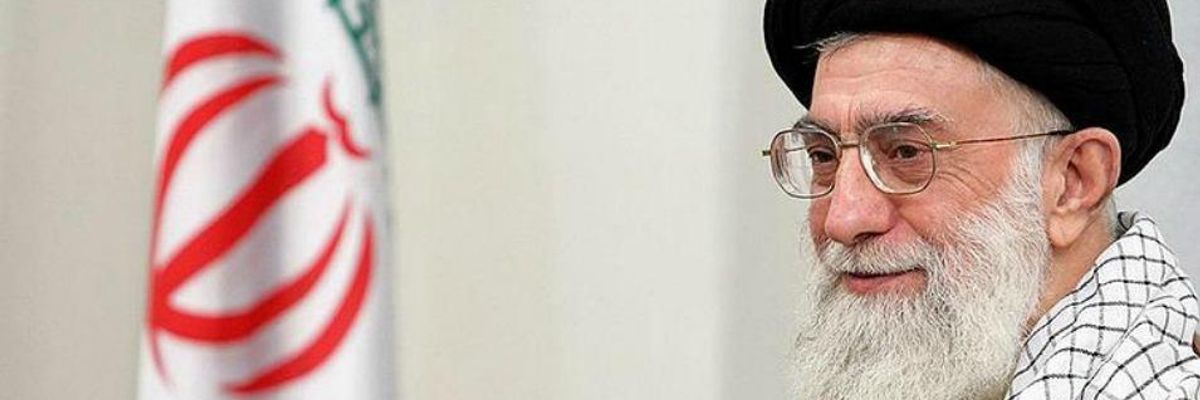
Ayatollah Ali Khamenei. (Photo: Aslan Media/flickr/cc)
To donate by check, phone, or other method, see our More Ways to Give page.

Ayatollah Ali Khamenei. (Photo: Aslan Media/flickr/cc)
Iran denied on Saturday that it reached a deal with the U.S. to ship its extra enriched uranium to Russia as part of an effort to minimize nuclear power.
Despite reports earlier in the week that a deal between Washington and Tehran had moved forward, Iran's foreign ministry spokeswoman Marzieh Afkham said Saturday that "no agreement on any nuclear topic" had been made.
Afkham added, "Such news is spread out of political motives and its goal is to tarnish the climate of the talks and make it more complicated to reach a settlement," according to state-run news agency IRNA.
A second media outlet did confirm that talks of transferring uranium abroad were taking place, however.
Peace talks between Iran and the six "P5+1" powers--the U.S., Russia, China, France, Britain, and Germany--are set to continue in Geneva on January 15, but barriers between their positions remain.
Reutersexplains:
An interim accord struck on Nov. 24, 2013, yielded steps by Iran to curb aspects of its sensitive nuclear activity, including higher-grade enrichment, in return for a measure of relief from economic sanctions. But last November, the two sides failed for a second time to meet a self-imposed deadline on ending the standoff and extended the period until June 30, 2015.
Among sticking points are the scope of uranium enrichment, the number of centrifuges and pace and sequencing of sanctions relief.
Iran has repeatedly denied that it has any nuclear weapons and has asked Western governments to drop their "unrealistic" demands.
Trump and Musk are on an unconstitutional rampage, aiming for virtually every corner of the federal government. These two right-wing billionaires are targeting nurses, scientists, teachers, daycare providers, judges, veterans, air traffic controllers, and nuclear safety inspectors. No one is safe. The food stamps program, Social Security, Medicare, and Medicaid are next. It’s an unprecedented disaster and a five-alarm fire, but there will be a reckoning. The people did not vote for this. The American people do not want this dystopian hellscape that hides behind claims of “efficiency.” Still, in reality, it is all a giveaway to corporate interests and the libertarian dreams of far-right oligarchs like Musk. Common Dreams is playing a vital role by reporting day and night on this orgy of corruption and greed, as well as what everyday people can do to organize and fight back. As a people-powered nonprofit news outlet, we cover issues the corporate media never will, but we can only continue with our readers’ support. |
Iran denied on Saturday that it reached a deal with the U.S. to ship its extra enriched uranium to Russia as part of an effort to minimize nuclear power.
Despite reports earlier in the week that a deal between Washington and Tehran had moved forward, Iran's foreign ministry spokeswoman Marzieh Afkham said Saturday that "no agreement on any nuclear topic" had been made.
Afkham added, "Such news is spread out of political motives and its goal is to tarnish the climate of the talks and make it more complicated to reach a settlement," according to state-run news agency IRNA.
A second media outlet did confirm that talks of transferring uranium abroad were taking place, however.
Peace talks between Iran and the six "P5+1" powers--the U.S., Russia, China, France, Britain, and Germany--are set to continue in Geneva on January 15, but barriers between their positions remain.
Reutersexplains:
An interim accord struck on Nov. 24, 2013, yielded steps by Iran to curb aspects of its sensitive nuclear activity, including higher-grade enrichment, in return for a measure of relief from economic sanctions. But last November, the two sides failed for a second time to meet a self-imposed deadline on ending the standoff and extended the period until June 30, 2015.
Among sticking points are the scope of uranium enrichment, the number of centrifuges and pace and sequencing of sanctions relief.
Iran has repeatedly denied that it has any nuclear weapons and has asked Western governments to drop their "unrealistic" demands.
Iran denied on Saturday that it reached a deal with the U.S. to ship its extra enriched uranium to Russia as part of an effort to minimize nuclear power.
Despite reports earlier in the week that a deal between Washington and Tehran had moved forward, Iran's foreign ministry spokeswoman Marzieh Afkham said Saturday that "no agreement on any nuclear topic" had been made.
Afkham added, "Such news is spread out of political motives and its goal is to tarnish the climate of the talks and make it more complicated to reach a settlement," according to state-run news agency IRNA.
A second media outlet did confirm that talks of transferring uranium abroad were taking place, however.
Peace talks between Iran and the six "P5+1" powers--the U.S., Russia, China, France, Britain, and Germany--are set to continue in Geneva on January 15, but barriers between their positions remain.
Reutersexplains:
An interim accord struck on Nov. 24, 2013, yielded steps by Iran to curb aspects of its sensitive nuclear activity, including higher-grade enrichment, in return for a measure of relief from economic sanctions. But last November, the two sides failed for a second time to meet a self-imposed deadline on ending the standoff and extended the period until June 30, 2015.
Among sticking points are the scope of uranium enrichment, the number of centrifuges and pace and sequencing of sanctions relief.
Iran has repeatedly denied that it has any nuclear weapons and has asked Western governments to drop their "unrealistic" demands.